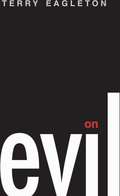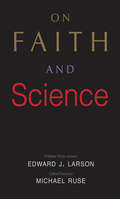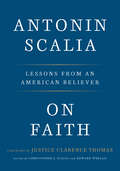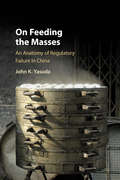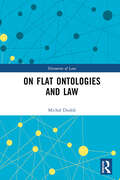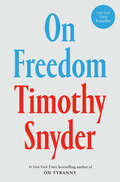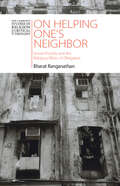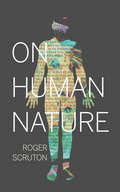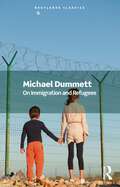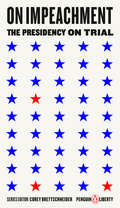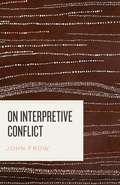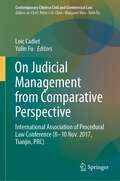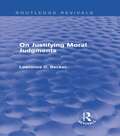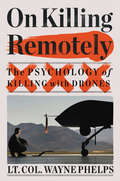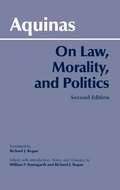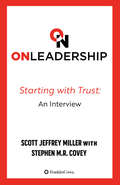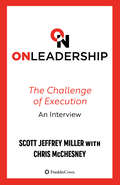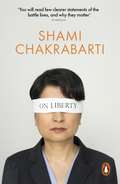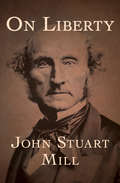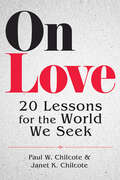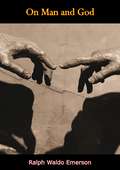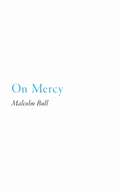- Table View
- List View
On Evil
by Terry EagletonFor many enlightened, liberal-minded thinkers today, and for most on the political left, evil is an outmoded concept. It smacks too much of absolute judgments and metaphysical certainties to suit the modern age. In this witty, accessible study, the prominent Marxist thinker Terry Eagleton launches a surprising defense of the reality of evil, drawing on literary, theological, and psychoanalytic sources to suggest that evil, no mere medieval artifact, is a real phenomenon with palpable force in our contemporary world. In a book that ranges from St. Augustine to alcoholism, Thomas Aquinas to Thomas Mann, Shakespeare to the Holocaust, Eagleton investigates the frightful plight of those doomed souls who apparently destroy for no reason. In the process, he poses a set of intriguing questions. Is evil really a kind of nothingness? Why should it appear so glamorous and seductive? Why does goodness seem so boring? Is it really possible for human beings to delight in destruction for no reason at all?
On Faith and Science
by Edward J. Larson Michael RuseA captivating historical survey of the key debates, questions, and controversies at the intersection of science and religion Throughout history, scientific discovery has clashed with religious dogma, creating conflict, controversy, and sometimes violent dispute. In this enlightening and accessible volume, distinguished historian and Pulitzer Prize–winning author Edward Larson and Michael Ruse, philosopher of science and Gifford Lecturer, offer their distinctive viewpoints on the sometimes contentious relationship between science and religion. The authors explore how scientists, philosophers, and theologians through time and today approach vitally important topics, including cosmology, geology, evolution, genetics, neurobiology, gender, and the environment. Broaching their subjects from both historical and philosophical perspectives, Larson and Ruse avoid rancor and polemic as they address many of the core issues currently under debate by the adherents of science and the advocates of faith, shedding light on the richly diverse field of ideas at the crossroads where science meets spiritual belief.
On Faith: Lessons from an American Believer
by Antonin ScaliaOn Faith is an inspiring collection of the late Supreme Court justice Antonin Scalia's reflections on his own faith, on the challenges that religious believers face in modern America, and on the religious freedoms protected by the Constitution. Featuring a personal introduction by Justice Scalia's son Father Paul Scalia, this volume will enrich every reader's understanding of the legendary justice.Antonin Scalia reflected deeply on matters of religion and shared his insights with many audiences over the course of his remarkable career. As a Supreme Court justice for three decades, he vigorously defended the American constitutional tradition of allowing religion a prominent place in the public square. As a man of faith, he recognized the special challenges of living a distinctively religious life in modern America, and he inspired other believers to meet those challenges. This volume contains Justice Scalia's incisive thoughts on these matters, laced with his characteristic wit. It includes outstanding speeches featured in Scalia Speaks and also draws from his Supreme Court opinions and his articles. In addition to the introduction by Fr. Scalia, other highlights include Fr. Scalia's beautiful homily at his father's funeral Mass and reminiscences from various friends and law clerks whose lives were influenced by Antonin Scalia's faith.
On Feeding the Masses
by John K. YasudaChina's food safety system is in crisis. Egregious scandals, as varied as the sale of liquor laced with Viagra and the distribution of fake eggs, reveal how regulatory practices have been stretched to their limit in the world's largest food production system. On Feeding the Masses focuses on the oft-cited but ultimately overlooked concept of scale to identify the root causes of China's regulatory failures in food safety. The 'politics of scale' framework highlights how regulators disagree on which level of government is best suited to regulate ('the scale of governance'), struggle to address multilevel tensions ('multidimensional scale integration'), and fail to understand how policies at one level of government can affect other levels of government in unexpected and costly ways ('scale externalities'). Drawing from over 200 interviews with food safety regulators and producers, the study provides one of the most comprehensive accounts of China's food safety crisis to date.
On Flat Ontologies and Law (ISSN)
by Michał DudekThis book examines the importance of flat ontologies for law and sociolegal theory. Associated with the emergence of new materialism in the humanities and social sciences, the elaboration of flat ontologies challenges the binarism that has maintained the separation of culture from nature, and the human from the nonhuman. Although most work in legal theory and sociolegal studies continues to adopt a non-flat, anthropocentric and immaterial take on law, the critique of this perspective is becoming more and more influential. Engaging the increasing legal interest in flat ontologies, this book offers an account of the main theoretical perspectives, and their importance for law. Covering the work of the five major theorists in the area – Gabriel Tarde, Bruno Latour, Manuel DeLanda, Karen Barad and Graham Harman – the book aims to encourage this interest, as well as to explicate the important problems of and differences between these perspectives. Flat ontologies, the book demonstrates, can offer a valuable new perspective for understanding and thinking about law.This book will appeal mainly to scholars and students in legal theory and sociolegal studies; as well as others with interests in the posthumanist turn in philosophy and social theory.
On Freedom
by Timothy SnyderNEW YORK TIMES BESTSELLER • A brilliant exploration of freedom—what it is, how it&’s been misunderstood, and why it&’s our only chance for survival—by the acclaimed Yale historian and author of the #1 New York Times bestseller On Tyranny&“A rigorous and visionary argument . . . Buy or borrow this book, read it, take it to heart.&”—The GuardianTimothy Snyder has been called &“the leading interpreter of our dark times.&” As a historian, he has given us startling reinterpretations of political collapse and mass killing. As a public intellectual, he has turned that knowledge toward counsel and prediction, working against authoritarianism here and abroad. His book On Tyranny has inspired millions around the world to fight for freedom. Now, in this tour de force of political philosophy, he helps us see exactly what we&’re fighting for.Freedom is the great American commitment, but as Snyder argues, we have lost sight of what it means—and this is leading us into crisis. Too many of us look at freedom as the absence of state power: We think we're free if we can do and say as we please, and protect ourselves from government overreach. But true freedom isn&’t so much freedom from as freedom to—the freedom to thrive, to take risks for futures we choose by working together. Freedom is the value that makes all other values possible.On Freedom takes us on a thrilling intellectual journey. Drawing on the work of philosophers and political dissidents, conversations with contemporary thinkers, and his own experiences coming of age in a time of American exceptionalism, Snyder identifies the practices and attitudes—the habits of mind—that will allow us to design a government in which we and future generations can flourish. We come to appreciate the importance of traditions (championed by the right) but also the role of institutions (the purview of the left). Intimate yet ambitious, this book helps forge a new consensus rooted in a politics of abundance, generosity, and grace.
On Gaslighting (Insights: Philosophy in Focus)
by Kate AbramsonA philosopher examines the complicated phenomenon of gaslighting&“Gaslighting&” is suddenly in everyone&’s vocabulary. It&’s written about, talked about, tweeted about, even sung about (in &“Gaslighting&” by The Chicks). It&’s become shorthand for being manipulated by someone who insists that up is down, hot is cold, dark is light—someone who isn&’t just lying about such things, but trying to drive you crazy. The term has its origins in a 1944 film in which a husband does exactly that to his wife, his crazy-making efforts symbolized by the rise and fall of the gaslights in their home. In this timely and provocative book, Kate Abramson examines gaslighting from a philosophical perspective, investigating it as a distinctive moral phenomenon.Gaslighting, Abramson writes, is best understood as a form of interpersonal interaction, a particular way of fundamentally undermining someone. The gaslighter, Abramson argues, aims to make his target experience herself as incapable of reasoning, perceiving, or reacting in ways that would allow her to form appropriate beliefs, perceptions, or emotions in the first place. He seeks not only to induce in her this unmoored sense of herself but also to make it a reality. Using examples and analysis, Abramson gives an account of gaslighting and its immorality, and argues that such a discussion can help us understand other aspects of social life—from racism and sexism to the structure of interpersonal trust.
On Helping One's Neighbor: Severe Poverty and the Religious Ethics of Obligation (New Cambridge Studies in Religion and Critical Thought)
by Bharat RanganathanExploring what he calls 'the moral horror that is severe poverty,' Bharat Ranganathan develops a demanding account of the obligations that affluent people have to assist severely impoverished people. He argues that this is an immediate ethical as much as a social or structural imperative. Noting that developmental economists and moral and political philosophers have focused on wealth inequalities in increasingly sophisticated ways, Ranganathan observes that – within religious ethics – normative issues around severe poverty have nevertheless received insufficient attention. Bringing together general moral, religious, and philosophical principles with particular economic, social, and political realities, and engaging constructively with the writings of John Rawls and Peter Singer, this passionately argued book boldly challenges deleterious trends within ethics by unpacking, in a much more systematic way than hitherto, the pressing dilemmas around acute impoverishment. It will find an eager readership among scholars of religion, ethics, developmental studies, and theology.
On Human Nature
by Roger ScrutonIn this short book, acclaimed writer and philosopher Roger Scruton presents an original and radical defense of human uniqueness. Confronting the views of evolutionary psychologists, utilitarian moralists, and philosophical materialists such as Richard Dawkins and Daniel Dennett, Scruton argues that human beings cannot be understood simply as biological objects. We are not only human animals; we are also persons, in essential relation with other persons, and bound to them by obligations and rights. Our world is a shared world, exhibiting freedom, value, and accountability, and to understand it we must address other people face to face and I to I.Scruton develops and defends his account of human nature by ranging widely across intellectual history, from Plato and Averroës to Darwin and Wittgenstein. The book begins with Kant's suggestion that we are distinguished by our ability to say "I"—by our sense of ourselves as the centers of self-conscious reflection. This fact is manifested in our emotions, interests, and relations. It is the foundation of the moral sense, as well as of the aesthetic and religious conceptions through which we shape the human world and endow it with meaning. And it lies outside the scope of modern materialist philosophy, even though it is a natural and not a supernatural fact. Ultimately, Scruton offers a new way of understanding how self-consciousness affects the question of how we should live.The result is a rich view of human nature that challenges some of today's most fashionable ideas about our species.
On Immigration and Refugees (Routledge Classics)
by Michael DummettThe philosopher Michael Dummett was one of the sharpest and most prominent commentators and campaigners for the fair treatment of immigrants and refugees in Britain and Europe. On Immigration and Refugees was the only book he wrote on the topic and among one of the most eloquent and important reflections on the subject to have been published in many years. Exploring the confused and often highly unjust and racist thinking about immigration, Dummett questions the principles and justifications governing state policies, pointing out that they often conflict with the rights of refugees as laid down by the Geneva Convention. With compelling and often moving examples, he points a new way forward for humane thinking and practice about a problem we cannot afford to ignore.This Routledge Classics edition includes a new Foreword by Sarah Fine.
On Impeachment: The Presidency on Trial (Penguin Liberty #1)
by Series Editor: Corey BrettschneiderA short, accessible collection of key historic writings about presidential impeachment, as part of a new Penguin Classics series on liberty and constitutional rights.A Penguin ClassicPenguin Liberty is a newly curated series of historical, political and legal classic texts from Penguin Classics. One of the first volumes, On Impeachment, provides key historic writings to understand what impeachment is and learn about three presidents who have been subject to the process: Andrew Johnson, Richard Nixon and Bill Clinton. The volume includes essential texts from each of the two presidential impeachments that were voted by the House, and the Nixon case, which was voted on by the House judiciary committee and which forced Nixon's resignation. Readers will have a scope of perspectives from the Constitution, George Washington, Alexander Hamilton, Frederick Douglass, Barbara Jordan, Gerald Ford, Dianne Feinstein, and more. Each volume will feature a series introduction and volume introduction by series editor Corey Brettschneider.
On Interpretive Conflict
by John Frow“Interpretation” is a term that encompasses both the most esoteric and the most fundamental activities of our lives, from analyzing medical images to the million ways we perceive other people’s actions. Today, we also leave interpretation to the likes of web cookies, social media algorithms, and automated markets. But as John Frow shows in this thoughtfully argued book, there is much yet to do in clarifying how we understand the social organization of interpretation. On Interpretive Conflict delves into four case studies where sharply different sets of values come into play—gun control, anti-Semitism, the religious force of images, and climate change. In each case, Frow lays out the way these controversies unfold within interpretive regimes that establish what counts as an interpretable object and the protocols of evidence and proof that should govern it. Whether applied to a Shakespeare play or a Supreme Court case, interpretation, he argues, is at once rule-governed and inherently conflictual. Ambitious and provocative, On Interpretive Conflict will attract readers from across the humanities and beyond.
On Judicial Management from Comparative Perspective: International Association of Procedural Law Conference (8-10 Nov. 2017, Tianjin, PRC) (Contemporary Chinese Civil and Commercial Law)
by Yulin Fu Loic CadietThis book consists of general reports of the International Conference on Judicial Management from Comparative Perspective. This conference held on November 8–10, 2017, at Tianjin University, was organized by China Law Society (CLS) and International Association of Procedural Law Congress (IAPL). The general reporters are prominent scholars who have been selected worldwide by the IAPL Presidium to organize national reporters who shall do researches of his/her own state under the guide of the general reporter’s questionnaire on the specific subject. By this way, the comparative studies are trying to depend on national researches but overcome the general style of “talk past each other.” Moreover, the general reports summarize and give comment on the various system, phenomena or situation from comparative perspective, from which the audience will read their own orientation, doctrines and theories.
On Justifying Moral Judgements (Routledge Revivals)
by Lawrence C. BeckerMuch discussion of morality presupposes that moral judgments are always, at bottom, arbitrary. Moral scepticism, or at least moral relativism, has become common currency among the liberally educated. This remains the case even while political crises become intractable, and it is increasingly apparent that the scope of public policy formulated with no reference to moral justification is extremely limited. The thesis of On Justifying Moral Judgments insists, on the contrary, that rigorous justifications are possible for moral judgments. Crucially, Becker argues for the coordination of the three main approaches to moral theory: axiology, deontology, and agent morality. A pluralistic account of the concept of value is expounded, and a solution to the problem of ultimate justification is suggested. Analyses of valuation, evaluation, the ‘is-ought’ issue, and the concepts of obligation, responsibility and the good person are all incorporated into the main line of argument.
On Killing Remotely: The Psychology of Killing with Drones
by Lieutenant Colon Wayne PhelpsA &“can&’t-miss for anyone interested in current military affairs,&” On Killing Remotely reveals and explores the costs—to individual soldiers and to society—of the way we wage war today (Kirkus Reviews, starred). Throughout history society has determined specific rules of engagement between adversaries in armed conflict. With advances in technology, from armor to in the Middle Ages to nerve gas in World War I to weapons of mass destruction in our own time, the rules have constantly evolved. Today, when killing the enemy can seem palpably risk-free and tantamount to playing a violent video game, what constitutes warfare? What is the effect of remote combat on individual soldiers? And what are the unforeseen repercussions that could affect us all? Lt Col Wayne Phelps, former commander of a Remotely Piloted Aircraft unit, addresses these questions and many others as he tells the story of the men and women of today&’s &“chair force.&” Exploring the ethics of remote military engagement, the misconceptions about PTSD among RPA operators, and the specter of military weaponry controlled by robots, his book is an urgent and compelling reminder that it should always be difficult to kill another human being lest we risk losing what makes us human.
On Law, Morality, and Politics (Second Edition)
by Thomas Aquinas Richard J. Regan William P. BaumgarthRetaining the selection of texts presented in the first edition, this second edition offers new translations by Richard J Regan -- including that of his Aquinas, Treatise on Law (Hackett, 2000). A revised Introduction and glossary, an updated select bibliography, and the inclusion of summarising headnotes for each of the units -- Conscience, Law, Justice, Property, War and Killing, Obedience and Rebellion, and Practical Wisdom and Statecraft -- further enhance its usefulness.
On Law, Politics, and Judicialization
by Martin Shapiro Alec Stone-SweetAcross the globe, the domain of the litigator and the judge has radically expanded, making it increasingly difficult for those who study comparative and international politics, public policy and regulation, or the evolution of new modes of governance to avoid encountering a great deal of law and courts. In On Law, Politics, and Judicialization, two of the world's leading political scientists present the best of their research, focusing on how to build and test a social science of law and courts. Chosen empirical settings include the United States, the GATT-WTO, France and Germany, Imperial China and Islam, the European Union, and the transnational world of the Lex Mercatoria.
On Leadership: Starting With Trust: An Interview
by Stephen R. Covey Scott Jeffrey MillerOn Leadership—A New FranklinCovey eBook Mini-seriesLearn the secrets of successful leadership from the experts. On Leadership: Starting with Trust, An Interview is the first in a new eBook mini-series based on the Scott Miller podcast series On Leadership With Scott Miller. FranklinCovey’s executive vice president of thought leadership, Scott Miller, has interviewed many of the top leaders and industry icons in the world, and now you can learn their secrets for successful leadership.On Leadership With Scott Miller is one of the industry’s fastest growing podcasts, dedicated to improving leadership capabilities. Now these timeless conversations are available in eBook format for readers everywhere. Each book follows Scott’s unique conversation with one of the world’s leading innovators, taking readers through all of the challenges, insights, and needed disciplines for character-based leadership. No leadership topic is out-of-bounds—all is discussed and revealed, from the secrets of trademarked leadership programs, to timeless books like The Speed of Trust, The 4 Disciplines of Execution, and more.In this first of the On Leadership eBook mini-series, Scott sits down with Stephen M.R. Covey, co-founder and Global Practice Leader of FranklinCovey’s Speed of Trust Practice. FranklinCovey’s Speed of Trust Practice helps organizations better manage change and create high-performing teams that are agile, collaborative, innovative, and engaged.In On Leadership: Starting With Trust, An Interview you will discover:There is nothing more impactful on people and work performance than trustThe immense effect trust has on results—when trust goes up, efficiency rises and costs go downActionable strategies to nurture and inspire trust in every encounterIf you were inspired by Brené Brown’s Dare to Lead or the timeless bestseller The 7 Habits of Highly Effective People by Stephen Covey, you will love On Leadership, the latest mini-series from the thought leaders at FranklinCovey.
On Leadership: The Challenge of Execution, An Interview
by Chris McChesney Scott Jeffrey MillerLearn the secrets of successful business leadership from the experts in this book from the series based on the popular podcast.This is the second in a new eBook mini-series based on the Scott Miller podcast series On Leadership With Scott Miller. FranklinCovey’s executive vice president of thought leadership, Miller has interviewed many of the top leaders and industry icons in the world, and now you can learn their secrets for successful leadership.On Leadership With Scott Miller is one of the industry’s fastest growing podcasts, dedicated to improving leadership capabilities. Now these conversations are available in eBook format for readers everywhere. Each book follows Scott’s unique conversation with one of the world’s leading innovators, taking readers through all the challenges, insights, and needed disciplines for character-based leadership. No leadership topic is out-of-bounds. All is discussed and revealed, from the secrets of trademarked leadership programs, to timeless books like The Speed of Trust, The 4 Disciplines of Execution, and more.In this second entry in the series, Scott sits down with Chris McChesney, Global Practice Leader of Execution for FranklinCovey. Chris is the primary developer of The 4 Disciplines of Execution. For more than a decade, he has led the consulting organization that has implemented the 4 disciplines for the State of Georgia and companies including Marriott International, Shaw Industries, Ritz Carlton, Kroger, Coca Cola, Comcast, FritoLay, Lockheed Martin, and many more.In On Leadership: The Challenge of Execution, An Interview learn how to:Take your knowledge of FranklinCovey’s 7 Habits of Highly Effective People to the next levelExecute on your organization’s strategies with excellence and precisionLead with “Wildly Important Goals®”Act on lead measuresCreate and keep a compelling scoreboardCreate a cadence of accountability
On Liberty
by Shami ChakrabartiOn Liberty is the story of today's threats to our freedoms and a highly personal, impassioned plea in defence of fundamental rights, from Shami Chakrabarti, Britain's leading human rights campaignerOn 11 September 2001, our world changed. The West's response to 9/11 has morphed into a period of exception. Governments have decided that the rule of law and human rights are often too costly. In On Liberty, Shami Chakrabarti explores why our fundamental rights and freedoms are indispensable. She shows, too, the unprecedented pressures those rights are under today. Drawing on her own work in high-profile campaigns, from privacy laws to anti-terror legislation, Chakrabarti shows the threats to our democratic institutions and why our rights are paramount in upholding democracy.'Probably the most effective public affairs lobbyist of the past 20 years' - David Aaronovitch, The Times 'The undaunted freedom fighter' - Observer'The most dangerous woman in Britain' - Sun
On Liberty: The Subjection Of Women
by John Stuart MillJohn Stuart Mill&’s masterwork: A meditation on the relationship between the individual and society One of the foremost thinkers of his age, John Stuart Mill was a steadfast advocate of individual freedom. This groundbreaking work explores the relationship between freedom and authority, between the citizen and the state, applying Mill&’s concept of utilitarianism to the philosophy of governance. Individual liberties, Mill argues, are threatened by the very concept of democracy, which is continually at risk of veering into tyranny. Mill outlines the basic liberties to which individuals are entitled as well as the dangers of governmental intervention. An enduring classic of political philosophy, On Liberty remains as relevant to government today as it was upon its first publication. A true cornerstone of liberalism, Mill&’s treatise is a powerful argument for individuality.
On Love: 20 Lessons for the World We Seek
by Paul W. Chilcote Janet K. ChilcoteBring love into action one small step at a time.In a world that often feels divided and dark, On Love reveals how everyday moments can become transformative acts of love. Drawing from their rich life experiences, Paul and Janet Chilcote offer twenty essential practices that anyone can begin immediately—no special training required. Each chapter shares relatable stories and simple practices that fit naturally into your daily routines, from making meaningful eye contact to creating beauty in ordinary spaces.Through refreshingly honest personal stories and down-to-earth wisdom, the Chilcotes show how small shifts in the way we interact with the world create ripples of positive change:Turn a hostile interaction into a moment of genuine connectionFind hope even in challenging circumstancesListen in ways that make others feel truly valuedCreate spaces of welcome in an increasingly isolated worldDiscover joy in simplifying your lifeWritten in an everyday conversational manner, On Love reads like a heart-to-heart talk with trusted friends who understand life’s complexities. This book meets you exactly where you are and invites you to discover how love transforms everything it touches.No homework, no complicated spiritual practices—just twenty simple ways to bring more love into your life and our world, starting with your next interaction.With your purchase of On Love, you’ll receive access to a free downloadable digital Companion Guide designed to help you get the most from these twenty transformative practices. Its flexible format allows you to use it for personal reflection and with small groups.The six-session guide includes:Weekly scripture connections that illuminate each practiceFocus verses for contemplationSimple reflection questions to deepen your experiencePractical guidance for implementing each practice in daily life
On Man and God
by Ralph Waldo EmersonOriginally published in 1961, the present volume is a collection of thoughts from the essays and journals of Ralph Waldo Emerson, leader of the transcendentalist movement of the mid-19th century. Subjects such as self-reliance, transcendentalism, nature as beauty, love and friendship, America and politics, and religions and sects are included.
On Manners (Thinking in Action)
by Karen StohrMany otherwise enlightened people often dismiss etiquette as a trivial subject or--worse yet--as nothing but a disguise for moral hypocrisy or unjust social hierarchies. Such sentiments either mistakenly assume that most manners merely frame the "real issues" of any interpersonal exchange or are the ugly vestiges of outdated, unfair social arrangements. But in On Manners, Karen Stohr turns the tables on these easy prejudices, demonstrating that the scope of manners is much broader than most people realize and that manners lead directly to the roots of enduring ethical questions. Stohr suggests that though manners are mostly conventional, they are nevertheless authoritative insofar as they are a primary means by which we express moral attitudes and commitments and carry out important moral goals. Drawing primarily on Aristotle and Kant and with references to a wide range of cultural examples--from Jane Austen's Pride and Prejudice to Larry David's Curb Your Enthusiasm--the author ultimately concludes that good manners are essential to moral character.
On Mercy
by Malcolm BullIs mercy more important than justice?Since antiquity, mercy has been regarded as a virtue. The power of monarchs was legitimated by their acts of clemency, their mercy demonstrating their divine nature. Yet by the end of the eighteenth century, mercy had become “an injustice committed against society . . . a manifest vice.” Mercy was exiled from political life. How did this happen?In this book, Malcolm Bull analyses and challenges the Enlightenment’s rejection of mercy. A society operating on principles of rational self-interest had no place for something so arbitrary and contingent, and having been excluded from Hobbes’s theory of the state and Hume’s theory of justice, mercy disappeared from the lexicon of political theory. But, Bull argues, these idealised conceptions have proved too limiting. Political realism demands recognition of the foundational role of mercy in society. If we are vulnerable to harm from others, we are in need of their mercy. By restoring the primacy of mercy over justice, we may constrain the powerful and release the agency of the powerless. And if arguments for capitalism are arguments against mercy, might the case for mercy challenge the very basis of our thinking about society and the state?An important contribution to contemporary political philosophy from an inventive thinker, On Mercy makes a persuasive case for returning this neglected virtue to the heart of political thought.
